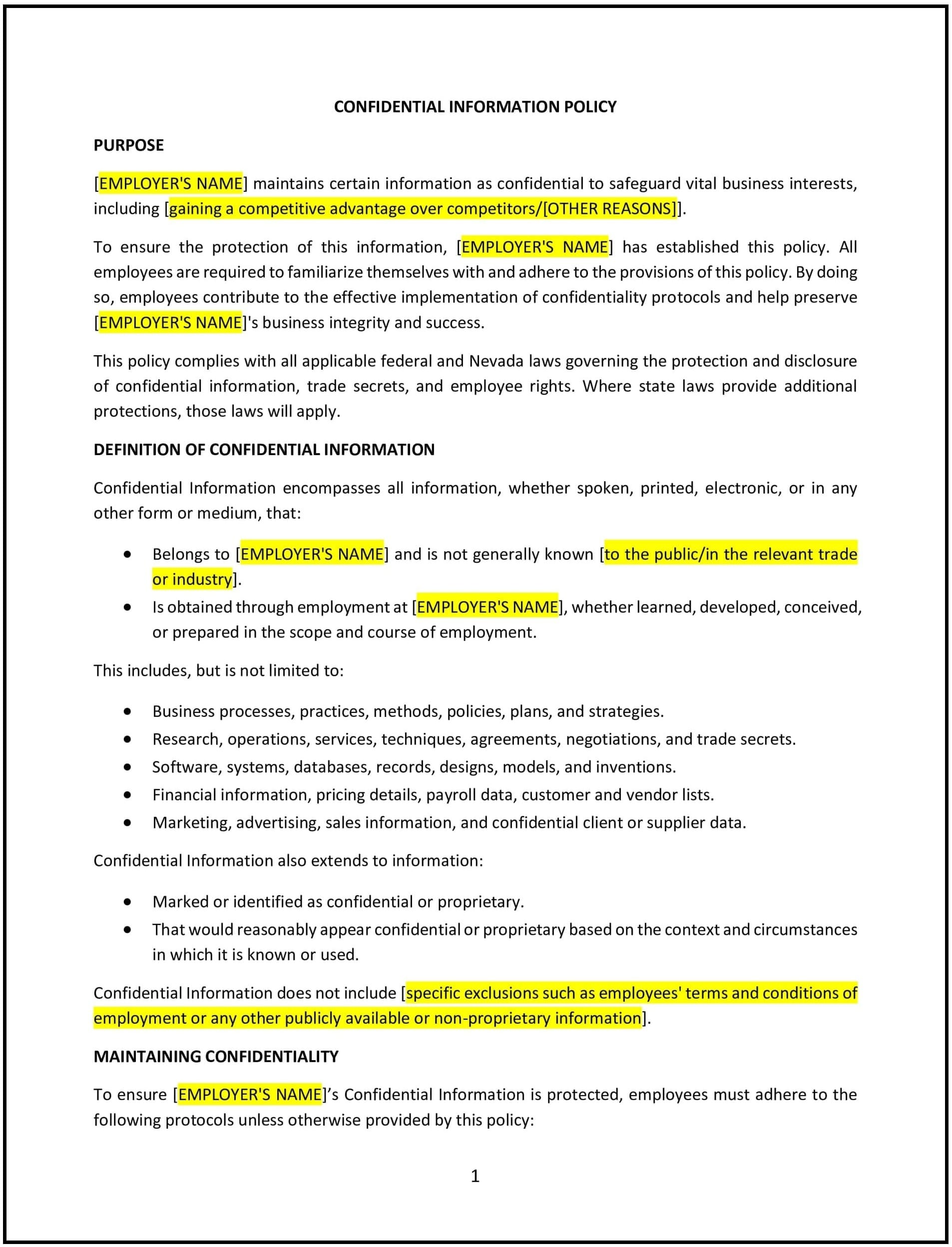Confidential information policy (Nevada): Free template
Got contracts to review? While you're here for policies, let Cobrief make contract review effortless—start your free review now.

Customize this template for free
Confidential information policy (Nevada)
This confidential information policy is designed to help Nevada businesses establish guidelines for the protection and management of confidential information. It outlines the types of information considered confidential, the responsibilities of employees in safeguarding that information, and the consequences of unauthorized disclosure.
By adopting this policy, businesses can ensure that sensitive company data, intellectual property, and personal information are protected from unauthorized access, use, or disclosure, and that employees understand their role in maintaining confidentiality.
How to use this confidential information policy (Nevada)
- Define confidential information: Clearly outline what constitutes confidential information, including business strategies, financial data, intellectual property, employee records, client and customer information, and any other sensitive data.
- Set expectations for handling confidential information: Establish procedures for handling, storing, and sharing confidential information. This may include physical security measures, such as locked storage, and digital security measures, such as encryption and password protection.
- Address disclosure guidelines: Specify when and how confidential information may be disclosed, including who is authorized to share the information and under what circumstances.
- Require confidentiality agreements: Require employees, contractors, and third parties with access to confidential information to sign confidentiality agreements or non-disclosure agreements (NDAs) to protect the company’s sensitive data.
- Clarify employee responsibilities: Clearly outline the responsibilities of employees in safeguarding confidential information, both during and after employment, including the return of company data upon termination or resignation.
- Address consequences of unauthorized disclosure: Set out the disciplinary actions that may result from unauthorized disclosure of confidential information, which may include termination, legal action, or financial penalties.
- Provide training: Offer training to employees on the importance of confidentiality, how to handle sensitive information, and how to identify and report potential breaches.
Benefits of using this confidential information policy (Nevada)
This policy provides several key benefits for Nevada businesses:
- Protects company assets: Safeguards sensitive business data, intellectual property, and client information, ensuring the company’s competitive advantage and reputation are not compromised.
- Promotes legal compliance: Helps ensure compliance with state and federal regulations regarding the handling of personal data, financial information, and other confidential materials.
- Reduces the risk of data breaches: Establishes clear guidelines for employees on how to protect confidential information, reducing the likelihood of data breaches or unauthorized disclosures.
- Enhances trust: Builds trust with clients, customers, and employees by demonstrating the company’s commitment to safeguarding sensitive information.
- Improves employee accountability: Clearly defines employees’ responsibilities, ensuring they understand the importance of confidentiality and the potential consequences of non-compliance.
Tips for using this confidential information policy (Nevada)
- Communicate the policy effectively: Ensure that all employees are aware of the policy and understand their role in protecting confidential information. This includes regular communication and reminders throughout the employee lifecycle.
- Conduct regular training: Provide regular training on how to handle confidential information securely, how to recognize confidential materials, and what actions to take if a breach occurs.
- Monitor compliance: Regularly monitor the handling of confidential information to ensure that employees are following the policy and implementing security measures correctly.
- Update the policy periodically: Review and update the policy to account for changes in regulations, company practices, or the types of information deemed confidential.
- Maintain confidentiality during employment transitions: Ensure that departing employees return all company data and are reminded of their ongoing responsibilities to maintain confidentiality even after employment ends.